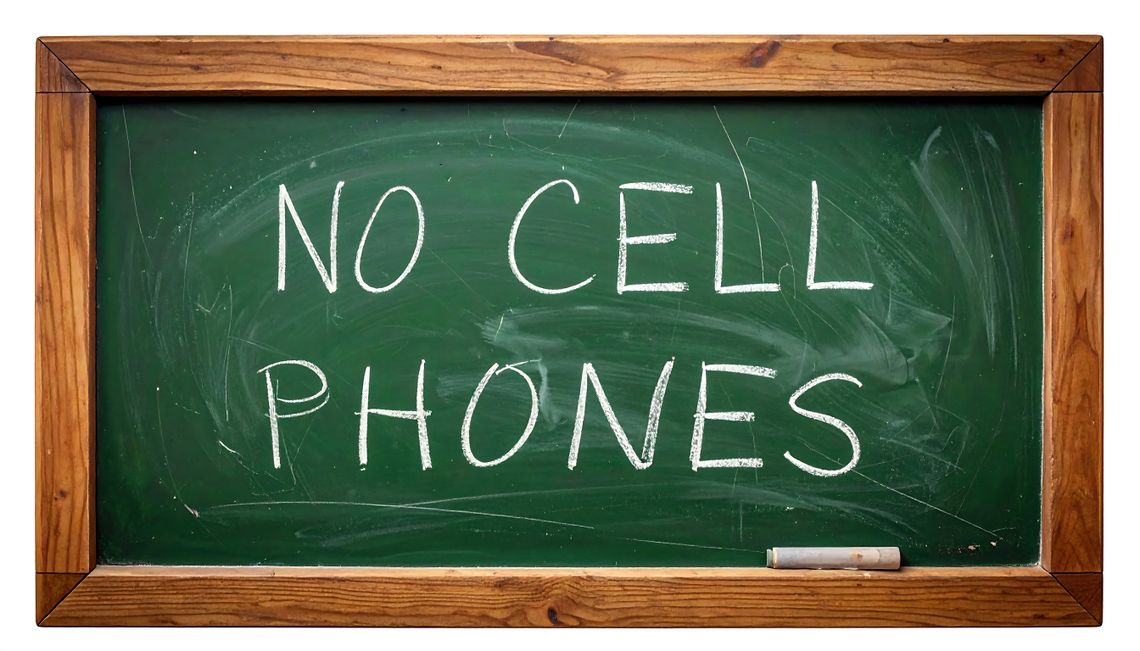By Robert Perea
After a robust debate including comments from students, parents and administrators on a proposal to make the district’s cell phone policy more restrictive, the Lyon County School District Board of Trustees voted to table the proposal until its October meeting.
The changes were proposed by Trustees Tom Hendrix and James Whisler, but after hearing the debate, Whisler said he had been convinced to give the current policy more time and see how it’s working.
The district’s current proposal prohibits the use of cell phones during instructional time, which is defined as the beginning of the school day until the end of the school day in kindergarten through eighth grade, and during class periods in high school. The new proposal would prohibit the use of cell phones during the school day in all grades.
Hendrix cited multiple studies conducted over the last 10-15 years that he said prove that smart phone use disrupts learning and harms students’ socialization and increases cyberbullying, depression and anxiety resulting from a lack of socialization.
He also said the same studies found that smartphone bans have resulted in double-digit increases in math and English performance.
“I still believe that cell phones need to be out of our schools from bell to bell,” Hendrix said.
The policy proposed by Hendrix would state that students shall not use personal internet-enabled electronic devices during the school day, with exceptions such as when it’s necessary to monitor a medical condition, for a student who is a caregiver for a family member or during an emergency.
Proposed consequences for violating the policy include after school detention or in-school suspension for the first infraction and increasing to Alternative Placement Education Program (APEP), the school keeping the phone for five days and long-term suspension. Hendrix said after talking to teachers, he removed expulsion as a consequence. During the debate, he then said he was also willing to present the proposal without long-term suspension as a consequence.
Much of the opposition from students, parents and some administrators was that the punishment for using a phone during class was too severe.
Smith Valley Schools Principal Duane Mattice, representing the Lyon County Administrators Association, said the proposed consequences were harsher than for bullying or a physical altercation.
Trustees Darin Farr and Elmer Bull spoke against changing the policy, saying that from speaking with teachers and administrators, they believe the district’s current policy is working.
“What they’re telling me is, this isn’t an issue,” Farr said. “Absenteeism is an issue. Inappropriate use of school-provided devices is sometimes more of an issue than the actual cell phones the kids bring from home. I don’t understand why we’re trying to float this boat, when the one we already have sails just fine.”
Hendrix argued that the district needs a consistent policy for all grades, K-12.
“The pushback I’m hearing is we don’t think we have a problem in high school, which is ludicrous if you ask me,” Hendrix said.
But Fernley High School Principal Ryan Cross said that collecting each student’s phone every day is not feasible.
“I don’t know how we’re going to collect 1,200 cell phones every day, and I don’t know if you considered the amount of instructional time that’s going to be lost,” Cross said. “We’re going to have to cut that last period short by 10, 15 minutes so they can go back to their first period class to collect their phones.”
Cross also pointed out that high schools are open campuses, meaning students can leave campus during lunch, and that students need their phone if they leave campus in case of an emergency.
“We don’t have a facility big enough to keep a closed campus,” he said. “If I’m going to keep every student here for lunch, I’m going to have to go to a schedule that has three or four lunches in order to get the numbers down to where they’ll fit in the lunchroom.”
Hendrix requested that the district’s high school administrators study the policy enforced at Silverland Middle School, where students sign a contract acknowledging that they cannot use their cell phone during school. Silverland Dean of Students Shaun McMackin said he has gone from taking away cell phones from several times a day to just a couple times so far this year.
When Hendrix asked Cross if he would be willing to implement the K-8 policy that phones had to be kept out of sight from the start of the school day until the end, Cross argued that there are legitimate uses for cell phones in high school.
“I don’t know if you are aware, but we actually purchase apps that students use on their cell phones and they’re used in certain classes in a purposeful manner,” Cross responded.
He added that high school teachers are allowed to use their discretion.
“And we support our teachers here,” he said. “I have some teachers that have policies that say, ‘If I see it, it’s mine, I’m taking it.’ That’s fine, we’ll support that. I have teachers that say, ‘you can use it when I tell you it’s okay to use it,’ and I have teachers that encourage the use of cell phones.”
As examples, he said students in weight training use their phones to track their progress, they use them in photography classes and they use them in classes that require scientific calculators.
“We’ve got a lot of kids doing work-based learning courses now. That’s how they report their hours,” Cross said. “There are just so many ways that they are used. I think we should be teaching kids to use them appropriately.”
Hendrix said his aim is to get the phones out of the hands of students during instructional time, between classes and during lunch, so they interact with their peers.
Cross said when students use their phones at lunch, they’re often playing games with their peers.
“When I do see kids on phones, I see kids playing games where they’re interacting with each other playing the same game at a table,” he said. “They’re talking, they’re having a good time.”
Fernley High Student Body President, Jackson Hohnholz, said the board should consider what all the parents, teachers and administrators were saying.
“Personally, I don’t think that this policy is reasonable whatsoever, and everyone has showed you guys that tonight,” he said.
School Resource Officer Melody Holland said the policy needs to be age-appropriate and pointed out that she watched some of the Trustees look at their phones during the discussion.
“We’re all adults, we all have cell phones, and yet all of us would end up in APEP tomorrow if this was our policy,” she said.
Following the discussion, Hendrix asked Cross and Mattice to look at the way Silverland is implementing the district policy and see if they would agree with implementing it at the high school level. His motion to table the item to the Oct. 28 meeting passed 6-0.









Comment
Comments